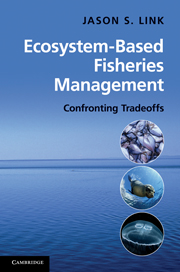Book contents
11 - Management institutions regarding EBFM
Published online by Cambridge University Press: 05 June 2012
Summary
All politics is local.
Tip O'Neill, former Speaker of the US House of Representatives (attributed)What is the purpose of a management institution? Why do we need a system of governance for the management of natural resources? I will draw upon the works of others (especially Charles2001) to explore this theme, but in many respects, we can start to address these questions by going back to first principles.
Basically, 100% of people do not act 100% legally, ethically, and morally 100% of the time. I often raise this point in various classes, and the students are mildly shocked to think about it. Then I ask these students if they all obeyed, to the fullest degree possible, every traffic law, speed limit, and motor vehicle regulation while they were driving to class, whereupon they concede the point, and grasp the need for governance.
Even if 100% of people did behave 100% legally, ethically, and morally 100% of the time, there would still be legitimate differences in perspectives, opinions, worldviews, etc. that need to be resolved. A governance system provides a venue for such differences to be resolved. There needs to be a system for addressing such tradeoffs, and governance institutions provide a framework or process in which to do NRM (Yaffee 1996).
The need for equitability in allocation of resources, particularly those natural resources that are in the public domain, is in large part the reason to have a governance structure in place.
- Type
- Chapter
- Information
- Ecosystem-Based Fisheries ManagementConfronting Tradeoffs, pp. 145 - 157Publisher: Cambridge University PressPrint publication year: 2010



